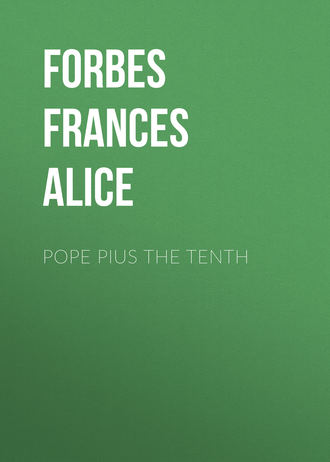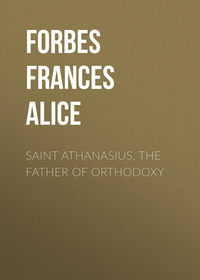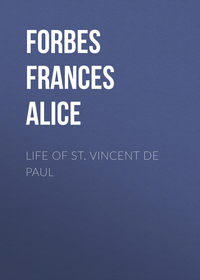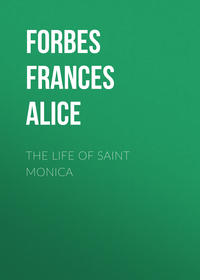 полная версия
полная версияPope Pius the Tenth
"It is not fair to your mother, Bepi," he would say; "you should think of her."
"God will provide for my mother," was the answer; "these poor souls were in greater need than she."
Invitations to preach in other parishes became more frequent. What he said was always simple, but it was full of teaching and went straight to the heart. The young priest had, moreover, a natural eloquence and a sonorous and beautiful voice. It was so evident that he spoke from the fullness of a soul on fire with the love of God that his enthusiasm was catching, and his sermons bore fruit. It happened on one occasion that a priest who had been invited to preach on a feast-day in the neighbouring village of Galliera was prevented at the last moment from coming. There was consternation at the presbytery. What was to be done?
"Leave it to me," said Don Carlo Carminati, curate of Galliera and a friend of Don Giuseppe; "I promise you it will be all right," and jumping into the presbytery pony-cart he took the road to Tombolo.
It was a Sunday afternoon and the hour of the children's catechism class. Don Giuseppe was at the church door, about to enter.
"Stop, stop," cried Don Carlo, "I want to speak to you." Don Giuseppe turned.
"You must come and preach at Galliera," said Don Carlo; "our preacher has fallen through."
"What are you thinking of?" exclaimed Don Giuseppe. "I cannot improvise in the pulpit!" and he turned once more to go into the church.
"You have got to come, your rector says so, and there is not a minute to lose," replied his friend; and, laying hold of the still expostulating Don Giuseppe, he packed him into the pony-cart, bowed to Don Antonio who stood smiling at the scene, and whipped up his steed. Arrived at Galliera, Don Carlo conducted his victim to an empty room, provided him with pencil and paper and left him. An hour later, having been set at liberty by his triumphant fellow-curate, Don Giuseppe vested and entered the church. The sermon that followed was so eloquent and so appropriate to the occasion that what had threatened to be a calamity became a cause for rejoicing. "Did not I tell you?" exclaimed Don Carlo.
Don Giuseppe's energy was boundless, and to him no labour was amiss. "Work," he used to say, "is man's chief duty on earth." When the presbytery cook fell ill, he both nursed him and took his place; for in his eyes any kind of work was a thing to draw men nearer to the Christ who was "poor and in labours from His youth."
Whether it was preaching, teaching, playing with the village children, visiting the sick, helping the dying, hearing confessions, catechizing the young or studying theology, it was all the same to him – work for the Master, and as such ennobling and honourable.
So the time passed, until Don Giuseppe had been eight years at Tombolo. Much as Don Antonio loved and appreciated his curate, or rather because of this very love and appreciation, it distressed him to think that his talents should have no wider sphere than a little country parish. He spoke of this one day to one of the canons of Treviso. The two curates of Galliera who were present joined enthusiastically in the praise of their friend. The canon became thoughtful.
"Do you think he could preach in the cathedral of Padua for the feast of St. Antony?" he asked after a moment of reflection.
"Most certainly, Monsignor," was the answer.
"Well," continued the canon, "if you will be responsible for his accepting, I will see to it that he is asked."
The feast-day sermon was naturally a topic of much interest in Padua. "Who is to preach?" was the question on everybody's lips on the morning of the great day.
"Don Giuseppe Sarto, a young priest who is curate of Tombolo," was the reply.
Now it was customary on the feast of St. Antony to ask a preacher of some distinction to occupy the cathedral pulpit.
"The curate of Tombolo!" was the apprehensive comment. "Oh dear! A country curate from an out-of-the-way village!" The cathedral was crowded for the high Mass. When the slight young figure of Don Giuseppe mounted the pulpit stairs there was a gasp of astonishment, which gave place to an expectant silence.
"His intelligence and culture were no less remarkable than his eloquence," wrote one of the congregation to a friend. "His imagery was beautiful, his style perfect." The sermon lasted over an hour, and no one thought it too long.
In the May of 1867 Don Giuseppe was appointed rector of Salzano. A wail of lamentation arose from the little parish where he had worked so faithfully for nearly ten years. "He was our father, our brother, our friend, and our comfort," cried the Tombolani. In the heart of Don Antonio grief for his loss contended with joy at the thought that the merits of his beloved Don Bepi had been recognized at last.
Salzano is a small country town in the province of Venetia. It has a handsome church with a graceful campanile and a somewhat imposing presbytery. The country is fertile, and the people, who are wholly given to agriculture, are quiet, steady and hard-working. The new rector arrived on a Saturday evening in July. At Mass the next morning, in spite of the heat, the church was crowded, for the inhabitants of the neighbouring villages had assembled in force to hear the sermon of the newly appointed parroco.
The result was a delightful surprise. "What was the bishop thinking of," they asked one another when Mass was over, "to leave a man like that buried all these years at a place like Tombolo?"
As for Don Giuseppe, he set to work at once to visit his people. His frank simplicity, his understanding sympathy and zeal for their welfare gained their hearts at once. As at Tombolo, he gave special attention to the instruction of children; and, not content with this, inaugurated classes in Christian doctrine for the adults. "Most of the evil in the world," he would often say, "comes from a want of the knowledge of God and of His truth."
In spite of the large parish and the handsome rectory, Don Giuseppe's habits were as frugal as ever. There was more to give to the poor, that was all. His sister Rosina kept house for him.
"Bepi," she said one day, "there is nothing for dinner."
"Not even a couple of eggs?"
A couple of eggs there were, and on these they dined.
But there was always a welcome at the rectory and a share of anything that was going for any old friend who dropped in. Don Carlo came one evening for a visit, and found Don Giuseppe in the kitchen playing games with some little children. They were sent home with a promise that the game should be continued on another occasion, and Don Carlo was pressed to stay. The next morning he was accosted by Rosina.
"Don Carlo, you are an old friend, and a very kind one," she began hesitatingly; "there is a man coming to-morrow who sells shirting."
"Really?" answered Don Carlo, rather at a loss to connect the statements.
"Yesterday my brother got a little money," continued Rosina, "and he has hardly a shirt to his back. Now if you were to try to persuade him to buy some shirting, I think he perhaps would do it. Will you do your best?"
Don Carlo promised, and took the first opportunity of broaching the subject.
"Nonsense, nonsense," was the answer, "there is no necessity at all," and the plea was cut short.
But Don Carlo was not so easily beaten; he knew the sunny nature of his friend, and determined to have recourse to strategy. On the arrival of the pedlar, he examined his materials, selected what he considered suitable, and set to work, after the manner of his country, to bargain. Having agreed on what he considered a fair price, he ordered the required length to be cut off, and turned to Don Giuseppe who had been innocently watching the transaction. "So many yards at such and such a price," he declared. "Pay up, Don Giuseppe!"
The rector was disgusted; but there was nothing to be done but to obey. The bargain had been made and the shirting cut off. "Even you come here and plot to betray me," he complained.
As for Rosina, her delight knew no bounds. "God bless the day you came, Don Carlo," she said, meeting him outside the door. "If you had not been here to-day, to-morrow there would have been neither money nor linen!"
Salzano was a large parish, and the rector had to keep a conveyance. It was not much to look at, but it did hard service, being at the disposal of everybody who appealed to the well-known charity of its owner. The horse came home one day with both knees badly damaged.
"I am very sorry," pleaded the borrower, "an accident.."
Don Giuseppe swallowed hard. "Never mind, never mind," he said; "it is all right."
One day – there had been a bad harvest that year, and there was much poverty in the parish – the rector asked a friend who was in easy circumstances to sell the horse for him. "You have so many relations with money," he pleaded.
The horse having been disposed of, it was then suggested that the same friend might also sell the carriage.
"I don't think I shall succeed," he remarked doubtfully, "for you must allow that it is not in the best condition." His fears were too true; no purchaser was found, and the carriage remained in the presbytery stable at the disposal of anyone who possessed a horse without a vehicle.
In 1873 there was a serious outbreak of cholera. The people of Salzano knew little of hygiene and less of sanitation; it was hard to make them take the most necessary precautions. Don Giuseppe was everything at once: doctor, nurse and sanitary inspector, as well as parish priest. Not only were there the sick and the dying to be tended, but the living to be heartened and consoled. "If it had not been for our dear Don Giuseppe," said an old man in later days, "I should have died of fear and sorrow during those dreadful times." Some of the people took it into their heads that the medicines and remedies ordered by the doctor were intended to put them quickly out of their pain, and would not take them unless they were administered by the priest's own hand.
For fear of infection, the dead had to be buried by night, and no one was allowed to attend the funeral. Anxious lest in the fear and the haste of the moment due honour should not be paid to these victims of the epidemic, Don Giuseppe was always there to see that all was done as it should be. Not only did he say the prayers and carry out the rites prescribed by the Church, but would take his place as coffin bearer, and even helped to dig the graves. Sorrow at the heartrending scenes he had to witness, added to these incessant labours by night and by day, would have ruined a less robust constitution than his. It is small wonder that Don Carlo Carminati, coming to visit him soon afterwards, was horrified at his appearance.
"You are ill!" he exclaimed.
"You think so?" was the quiet answer.
"He is ill," interposed Rosina vehemently, "but what can you expect? He is everybody's servant, he never spares himself. He has not only given away the food from his own mouth, but his night's rest. Look at him, nothing but skin and bone!"
"Your sister is right, you are doing too much. Remember that the pitcher can go to the well once too often; and when it is quite worn out, it will break."
"You are becoming quite an orator," commented Don Giuseppe with a smile.
Don Carlo was a man of action. He wrote to Don Antonio Costantini telling him that their dear Giuseppe was killing himself, and begging him to give a hint to the diocesan authorities. The hint was duly conveyed and duly taken. The bishop wrote to the rector of Salzano, ordering him to take more care of himself; but this was an art which Don Giuseppe had never studied, and he did not know how to begin. He continued to devote himself body and soul to his flock, leaving himself to the care of God.
With Don Giuseppe the service of Christ in His poor went hand in hand with the service of Christ at the altar. During his ministry at Salzano the parish church was greatly improved and beautified. He got together a choir of young men and boys and taught them to sing the stately Gregorian music that he loved for its devout and prayerful spirit. Even those who knew the stark poverty of the rector's private life did not always understand how the means could be obtained to carry out the plans he had at heart.
"But how will you get the money?" they would sometimes ask.
"God will provide," was the quiet answer, given with the serene faith characteristic of the strong.
III
CANON AND BISHOP
In the early spring of the year 1875 the chancellor of the diocese of Treviso was removed to Fossalunga. A canon's stall was also vacant, while the seminary was in need of a spiritual director. It was the general opinion that if these three offices could be held by one holy, wise and purposeful man, it would be an excellent thing for all parties concerned.
"I have it!" said Bishop Zinelli, "Don Giuseppe Sarto is the very man we need."
No sooner said than done. The rector of Salzano was named chancellor and residential canon of the cathedral of Treviso, and appointed spiritual director of the seminary. The bishop had not forgotten the warnings of Don Giuseppe's friends. By this arrangement the newly appointed canon would reside at the seminary, where the care of his health would not be left entirely in his own hands. He would, moreover, preside at the professors' table, and therefore would be unable to indulge his tendency to starve so as to feed the poor.
The news was received with mixed feelings by the people of Salzano. Joy that their beloved father should receive such a mark of honour struggled hard with their grief at losing him. It comforted them a little, they said, to think that his precious gifts, instead of being spent on Salzano alone, would now find full scope in a diocese that counted two hundred and ten parishes.
It was not until the autumn of the same year that Don Giuseppe bade farewell to his sorrowing parishioners, and, taking possession of his stall, sang the first vespers of Advent Sunday in the cathedral of Treviso. Like all the other professors of the seminary, Canon Sarto had three small rooms set apart for his use. From the windows he could look across the neatly-kept garden to where the quiet waters of the Sile, flowing by the ivy-coloured walls, widened out into little lakes amongst the thickets of poplar and plane trees that lay beyond.
The rector of the seminary was Don Giuseppe's old friend Pietro Jacuzzi, and there were in the college 160 lay students and 54 aspirants to the priesthood. "I well remember Monsignor Sarto's first instruction," said one of the latter in after years. "'You are expecting to find in me,' he began, 'a man of profound learning and of wide experience in spiritual matters, a master in asceticism and doctrine. You will be disappointed, for I am none of these things. I am only a poor country parish-priest. But I am here by God's will – therefore you must bear with me.' I have forgotten the instruction," added the narrator, "but the preamble I shall never forget."
A regular course of instruction and meditation was begun at once, and immediately won the attention of the students. The lucid simplicity with which Monsignor Sarto spoke carried the minds of his hearers straight into the heart of the truth which they were considering. The students were never tired, never puzzled, his conferences being eminently practical and within the grasp of his audience. His aim was to inculcate real solid piety which would endure throughout the troubles and temptations of life. It is not everybody who has the art of appealing to the young: it was one in which Monsignor Sarto excelled. Even in his familiar talks, full of merriment and sympathy, there was always something helpful and uplifting. Personal cleanliness, not as a rule the most prominent characteristic of southern nations, was a thing on which he laid particular stress. Gentle and kind as he was to all weakness and suffering, he could be stern enough when it was necessary, and his reproofs were seldom forgotten. If any of the students fell sick, he would nurse them with a mother's tenderness; and to those of the seminarists who were the sons of poor parents he gave material as well as moral help.
It happened that one of these students was in great distress by reason of a family difficulty. His father, a poor working man, was in urgent need of a few pounds, and there was no means of obtaining the sum. He confided his trouble to one of his companions, who asked him why he did not go to Monsignor Sarto and tell him all about it. The advice was taken, and he knocked at the familiar door. Monsignor Sarto was seated at his table reading. "What can I do for you?" he asked kindly.
The young man, who found it difficult to put his trouble into words, stammered out the whole story, Monsignor Sarto listening with compassion. "I am so sorry," he said when the tale was ended, "but I have only a few lire, nothing like the sum you require." The poor student broke down completely, for his last hope was gone.
"Come, come; cheer up!" cried the good canon, greatly distressed; "come to me to-morrow, and if I cannot give you all, I may be able to give you part of the money."
Next morning the seminarist returned.
"Well?" said Monsignor Sarto.
"Well?" answered the student nervously.
"Do you really think," continued the canon, "that I can manufacture banknotes?" Then, seeing the young man's distress, he added hastily: "Come come, my son, I was only joking, I have got the money," and, opening a little drawer, he took out the required sum.
"You will soon be a priest," he continued, "and when you can do so without inconvenience, you must give it back to me, for you see I have had to borrow it myself."
The winters were sometimes bitterly cold at Treviso, and the house was unwarmed. The needy students would often find warm clothing provided for them by the same charitable hand. A tradesman of Treviso certified that he received many orders from Monsignor Sarto for warm cloaks, with strict injunction to keep the matter secret. That the canon had seldom more than a few lire in his possession was not surprising.
It was a labour of love to him to prepare the little boys for their first communion. The vice-rector begged that this task might be left to those of the staff who had more time to spare.
"It is my duty," was the answer. "Am I not their spiritual father?"
In order to obtain the necessary time Monsignor Sarto deprived himself of the evening walk which was his only recreation after a day of hard work; and, assembling his lively little band of neophytes in the church, he would hold them spellbound.
His kindness and quick sympathy made him as popular with the staff. Laying aside the cares of his office together with the big bundle of papers that accompanied him everywhere, he set himself to make the time spent in the refectory as refreshing for the minds as it was for the bodies of his colleagues. The amusing stories told by him and the interesting discussions he set afoot were long remembered, as was his sly teasing of certain professors. These were not the moments, he held, for discussing serious questions; anyone who mentioned the word logic, for instance, was obliged to make amends by telling an interesting or useful story. When Monsignor Sarto's place was empty, everything fell flat.
He still kept up his old habit of working during part of the night. His neighbour in the seminary would often hear him moving in his room long after everyone else had retired to rest. "Go to bed, Monsignor," he would sometimes call out. "He works ill who works too long."
"Quite true, quite true, Don Francesco," would come the answer; "put that into practice. Go to bed and sleep well." It was past midnight before Monsignor Sarto's light went out, and he was up again by four o'clock.
In 1879 Bishop Zinelli died, and Monsignor Sarto was elected vicar capitular to administer the diocese while the see remained vacant. He announced his nomination in characteristic words.
"Called by the votes of my colleagues to administer the diocese of Treviso in place of him who for so many years has ruled it with such wisdom, prudence and zeal, I must frankly confess that I have accepted this heavy burden, not only because I feel assured that they will help me in my task, but because I know the spirit of the clergy. That you will earnestly co-operate with me in upholding the most precious prerogatives of the priesthood I have no doubt. I ask you, therefore, to remember the words of the Apostle: 'Walk carefully, that our ministry be not blamed'; let our actions be such that our enemies shall find nothing in us worthy of reproach. You are full of zeal for souls: seek to win them rather by love than by fear. The supreme wish of our Lord for His own was that they should love one another, and this wish found its fulfilment in apostolic times, when the Christians were one heart and one soul in Christ. A priest's life is a continual warfare against evil, which cannot fail to raise up powerful enemies. In order that they may not prevail against us, let us be united in charity amongst ourselves; thus we shall be invincible and strong as a rock."
Monsignor Sarto administered the diocese for less than a year, but in this short time he accomplished much. Although still spiritual director of the seminary, he preached oftener in public, his sermons invariably rousing enthusiasm. In the February of 1880 he was relieved of this office on the nomination as bishop of Monsignor Callegari, who was to find in his chancellor a devoted and faithful friend. The new bishop, however, was destined to remain but a short time at Treviso. In 1882 he was promoted to Padua, Monsignor Apollonio succeeding him at Treviso.
In September, 1884, Monsignor Apollonio, who had been making the pastoral visit of his diocese, returned home rather unexpectedly, and Monsignor Sarto was not a little surprised at being summoned somewhat mysteriously to the bishop's private oratory. "Let us kneel before the Blessed Sacrament," said Monsignor Apollonio gravely, "and pray about a matter which concerns us both intimately." Still more astonished, Monsignor Sarto knelt, and the two prelates prayed for a moment in silence. Then the bishop rose, and, handing a letter to his companion, bade him read it. Thus did Monsignor Sarto learn his nomination to the bishopric of Mantua.
The strong man who all his life long had welcomed hardship and suffering with a cheery smile, wept like a child. He was, he declared, utterly incapable, quite unworthy of such a trust. The bishop, who knew better, but whose heart was touched at the sight of his friend's distress, comforted him as best he could. "It is God's will," he said; "trust in His help." Convinced, however, in his own mind that Pope Leo XIII was wholly mistaken in his judgment of him, Monsignor Sarto wrote to Rome to profess his incapacity and worthlessness. His arguments were not accepted.
Early in November, amidst enthusiastic demonstrations, the bishop-elect set out for Rome. At Padua he met with a fresh ovation, Monsignor Callegari himself came to the station to greet his old friend and to wish him well. On the evening of the 8th he was received by Pope Leo, and left his presence consoled and full of courage as to the future. Consecrated on the 16th, he remained in Rome for ten days longer, returning on the 29th to Treviso, where he was to remain for some months before entering on his episcopal charge.
It was during this time that he went one day, accompanied by a friend, to visit a Venetian city. In the railway carriage were two gentlemen, who, while conversing on local subjects, touched on the election of the new bishop of Mantua. They wondered what kind of a man Monsignor Sarto was; not very intelligent, they feared, nor very gifted. The bishop-elect, with a sign to his companion to keep quiet, joined in the conversation, endorsing most heartily everything that they said in his own disparagement. He then proceeded to contrast the poor picture he had painted of himself with the qualities that were necessary for an ideal bishop, and this with such ability and discernment that his two hearers were greatly impressed. Monsignor Sarto was the first to leave the carriage.
"Who is that delightful priest?" asked the gentlemen of his companion, who was preparing to follow.
The latter made a low bow. "Monsignor Sarto, Bishop-elect of Mantua," he answered with elaborate irony.





